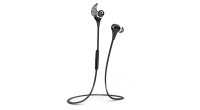The moment Abigail was brought to me in the recovery room after the c-section, she immediately latched onto my breast. I was still out of it for the most part, but it was a pretty life-altering moment, even if I didn’t understand it as it happened.
If nothing else, it meant something to me that we were able to do it as breastfeeding was a goal of ours. I wasn’t breastfed – and was no worse for the wear – but the benefits are so great that there was no way we weren’t going to adamantly pursue it. And for the first two nights, everything was pretty magical. No joke, the kid was a latching champ. And while she was up every couple of hours to feed, I didn’t mind much, especially in the hospital. I just kept her with me and when she woke up, we were off. Scott would wake up to walk her and burp her and change her since walking wasn’t an option for me at the time. The whole dance we did as a new little family is something I’ll never forget.
—
I’m not breastfeeding, at least I’m not any longer. I’m not interested in burying the lede here, so there you have it.
I am not breastfeeding because I physically can’t. And I swear on a stack of Bibles if I get one comment that even closely resembles advice or chiding, I will hunt you down and step on your toe. I literally cannot produce enough milk to feed my child. I am one of those “rare” women who cannot adequately breastfeed, and no amount of suggestions or “helpful” storytelling will change that fact.
So, you know, save it.
—
We had no initial reason to be concerned – Abigail was pooping and peeing just fine, the indicators you use to gauge such things. Then, one morning, the day before we left the hospital, we were told there was a chance we “might be breastfeeding too much,” and that she was using me as a “human pacifier,” as if either of those things were a bad thing for a Three-Day-Old child. About two hours later, with no change in our routine, we had a shaking, screaming baby on our hands, and we were then told we weren’t breastfeeding enough by the looks of it.
We tried explaining that Abigail doesn’t like being naked – hence the shaking and screaming – but no one was having any of it. After a round of breastfeeding, right in the hospital nursery, Abigail was put under the warmer, given a bath and then, after seeing her shake again, had her sugar levels tested. Everything was normal, so we went back to our room.
Later that night, however, her temperature spiked. Her weight had dropped far below the acceptable range that all babies lose after they’re born. The hospital called her pediatrician, the one we’d be working with who is associated with the hospital, and after reviewing Abigail’s condition, ordered her to have formula supplemented to her diet.
I cried. Felt hollow inside. Ultimately, it was a no-brainer. Give the baby some formula.
She gulped it down and then some. Within days her weight climbed and her fever disappeared. She quit latching as easily, but she was thriving.
—
Immediately we emailed a private lactation consultant to come out to the house. For 2 1/2 hours, she helped us through positions, holds, techniques and more. But the big gauge? Abigail was weighed on her baby scale prior to feeding – twice. And each time, no matter how much she “fed,” she never put on a single bit of weight. Not a one. The lactation consultant asked me a variety of questions, none which seemed substantial to me but in the end?
My breasts never grew larger. Ever.
My breasts are set wide apart from each other.
My breasts are of an odd shape (I don’t think she used the word”odd,” but that’s what I’m using here.).
We had fertility problems.
I had a c-section.
I have a thyroid disease that actively wrecks havoc on my hormones and has for years.
She told us to be prepared for the possibility that we wouldn’t be able to breastfeed. So I did, but mentally and emotionally I assumed that my milk just hadn’t come in, that I would make this work. For an entire week, I did everything and then some to feed my child, to produce milk, to be able to sustain that activity between she and I.
I cried. A lot. Both from the tenderness of it all and the sadness. Deep down, I knew. I just did. I know my body all too well, having spent years and years developing a decently fine-tuned sense of what it’s capable of when pushed and challenged. I knew that all of the sensations that women have when their bodies are producing milk were not at all happening with me.
And each night, as I sat with my daughter in my lap, I watched as she tried just as hard as I did. Even at just a week old, it was clear she inherited her mother’s doggedness, and she and I were not going down without a fight. At one point, she whipped her little head back in between sips on the bottle and latched onto my boob. It was the craziest thing I ever saw.
I thanked her for the effort, but it was clear: that was one hungry kid. It wasn’t up to her to make this work. This was a job for The Mama.
—
We consulted our doula. More advice from the lactation consultant. Our pediatrician. We decided that at this point, the only thing left to do would be to try breastfeeding, exclusively, once again to determine if I was producing enough milk. While we’re clear about what supplementing can do to a woman’s supply, we felt confident that with all of the extra feedings, the pumpings, and that it was still early in the game, that we could maybe “recover.”
With our pediatrician’s full support, and a follow-up appointment for today, we set out this weekend to see if we could go back to breastfeeding exclusively.
We lasted 12 hours. Abigail screamed. Wailed. Shook. Sobbed. Beyond the “normal.” We recognized the signs, and all agreed that if she exhibited signs of hunger like we’d seen before, we’d feed our kid the formula. She gulped down formula and then some, sleeping like a champ. She was a whole different kid.
—
We haven’t turned back. I had one breast leak only once. They were engorged for maybe 12 hours after that feeding. Nothing else has come from my breasts. The shop has closed up. I head back to the pediatrician today to let him know how it went.
I do not feel guilty. I feel sad, but I don’t feel guilty.
Honestly? I feel relieved. I am taking deep breaths again. I am not so worried about whether or not I’m unintentionally starving my child. Again. Our family is working like a better-oiled machine.
—
I wish I could tell you that I “made” it or that I figured out a way to make it work. Once again, my body just decided that what I wanted and what it could do were not compatible. It would perhaps be better if I could tell you that I mourn this now, but I don’t. I mourned and mourned for two weeks, and my daughter doesn’t need me mourning a bit longer.We made that decision on Saturday as we watched her writhe and scream for nourishment.
There was nothing more agonizing than learning in the hospital that our daughter was dropping weight and was sick. We choose not to explore that experience again, and as her parents, make the educated call to put her on formula. We’re not purchasing donor milk, as wonderful of a program as that is. I’m not using an SNS and we’re opting against expensive drugs that are thought to help with production. None of this was an easy call for us, but it’s the best call for our family, considering what we have to work with right now.
We exhausted everything we could, and while there are other things we could pursue, emotionally I am spent. While I’m quite certain that I’m not in the throws of PPD, I can see how I could easily start skipping down that road should I take this on. I won’t put my family through that on the off-chance I can make my body respond the way I’d like it to. After years of watching it betray me in small, non-essential ways, I’m fairly accustomed to being faced with a big fat “no” where it’s concerned and I’ve figured out how to live and let live.
This is what we choose to do here.
My kid, for the record, is doing great.
—
This can be such a class issue, can’t it? I think of all of the women who struggle similarly but who are told to “do more” just to prove to some random people outside of their families that they’re really mother enough to give up the fight, because, YOU KNOW, it’s actually RARE that women can’t breastfeed, which OH MY GOD might be true but stop and think about what that sounds like to the woman who is struggling to breastfeed.
Even if that’s not what’s said, it’s the message that gets communicated.
You need to try harder. Do more. Be more.
But what if you’re not like me – to be blunt and risk the wrath of some of you – and can’t afford private, non-insurance-covering support to figure out if, yes, you get a pass and no one to give you shit about how you’re feeding your child. I mean it. I have the means and the time to have professionals help me unlock this code and sure enough, I can’t breastfeed. I am, for some people perhaps, absolved from the sin of not being able to feed my kid from my breasts.
Not that I feel like I need it, but you know what I mean.
So I sit there and think, “Jesus. What of the women who don’t have this access? Do they ever feel absolution from the great masses of people who think they know best? Do they ever forgive themselves when the rest of the world thinks they shouldn’t?”
Forgiving myself for not being able to do this has felt like the world’s biggest boulder to carry. I will always cringe inside for not being able to do this for Abigail, no matter how much peace I feel about the situation. That peace came with a price tag, though, and I know emotionally and mentally I am better for it. I can take on anyone who would dare judge me for not breastfeeding because of what we were able to do to get to this point.
I just wonder why we can’t help all women feel peace with their choices, no matter what they are.
—
I love my kid. I’m glad she’s OK. I wish the road we were on would have been a little different. It’s not. I’m pretty sure we’ll be just fine.















